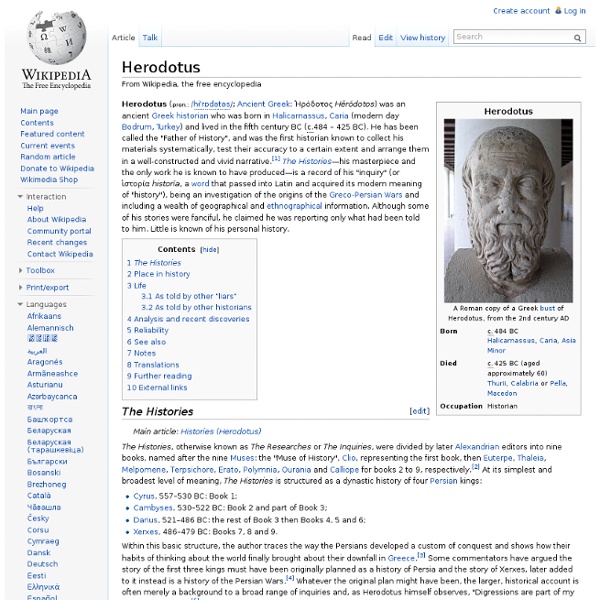Socrates of Constantinople
Socrates of Constantinople (/ˈsɒkrətiːz/; Greek: Σωκράτης), also known as Socrates Scholasticus,[1] not to be confused with the Classical Greek philosopher Socrates, was a Greek Christian church historian, a contemporary of Sozomen and Theodoret, who used his work; he was born at Constantinople c. 380: the date of his death is unknown. Even in ancient times nothing seems to have been known of his life except what can be gathered from notices in his Historia Ecclesiastica ("Church History"), which departed from its ostensible model, Eusebius of Caesarea, in emphasizing the place of the emperor in church affairs and in giving secular as well as church history. Socrates' teachers, noted in his prefaces, were the grammarians Helladius and Ammonius, who came to Constantinople from Alexandria, where they had been pagan priests. A revolt, accompanied by an attack on the pagan temples, had forced them to flee. The Historia Ecclesiastica[edit] Socrates' account is in many respects well-balanced.
Plutarch
Plutarch (/ˈpluːtɑrk/; Greek: Πλούταρχος, Ploútarkhos, Koine Greek: [plǔːtarkʰos]; later named, on his becoming a Roman citizen, Lucius Mestrius Plutarchus (Λούκιος Μέστριος Πλούταρχος);[a] c. 46 – 120 AD),[1] was a Greek historian, biographer, and essayist, known primarily for his Parallel Lives and Moralia.[2] He is considered today to be a Middle Platonist. Early life[edit] Ruins of the Temple of Apollo at Delphi, where Plutarch served as one of the priests responsible for interpreting the predictions of the oracle. Plutarch was born to a prominent family in the small town of Chaeronea about twenty miles east of Delphi in the Greek region known as Boeotia. His family was wealthy. His brothers, Timon and Lamprias, are frequently mentioned in his essays and dialogues, where Timon is spoken of in the most affectionate terms. The exact number of his sons is not certain, although two of them, Autobulus and second Plutarch, are often mentioned. Work as magistrate and ambassador[edit]
Tacitus
Roman historian and senator (c. 56 - c. 120) Publius Cornelius Tacitus,[note 1] known simply as Tacitus ( TAS-it-əs,[2][3] Latin: [ˈtakɪtʊs];[citation needed] c. AD 56 – c. 120), was a Roman historian and politician. Tacitus is widely regarded as one of the greatest Roman historians by modern scholars.[4][5] Life[edit] Details about the personal life of Tacitus are scarce. Family and early life[edit] In his article on Tacitus in Pauly-Wissowa, I. There is no mention of Tacitus's suffering such a condition, but it is possible that this refers to a brother—if Cornelius was indeed his father.[14] The friendship between the younger Pliny and Tacitus leads some scholars to conclude that they were both the offspring of wealthy provincial families.[15] His ancestry, his skill in oratory, and his sympathetic depiction of barbarians who resisted Roman rule (e.g., Ann. 2.9) have led some to suggest that he was a Celt. Public life, marriage, and literary career[edit] Works[edit] The Histories[edit]
Sima Qian
Sima Qian (Szu-ma Chien; c. 145 or 135 BC – 86 BC) was a Chinese historian of the Han dynasty. He is considered the father of Chinese historiography for his work, the Records of the Grand Historian, a Jizhuanti-style (纪传体) general history of China, covering more than two thousand years from the Yellow Emperor to his time, during the reign of Emperor Wu of Han. Although he worked as the Court Astrologer (Chinese: 太史令; Tàishǐ Lìng), later generations refer to him as the Grand Historian (Chinese: 太史公; taishigong or tai-shih-kung) for his monumental work; a work which in later generations would often only be somewhat tacitly or glancingly acknowledged as an achievement only made possible by his acceptance and endurance of punitive actions against him, including imprisonment, castration, and subjection to servility. Early life and education[edit] As Han court official[edit] The Li Ling affair[edit] Portrait of Sima Qian Historian[edit] The first page of Shiji. Literary figure[edit] Astrologer[edit]
Josephus
Romano-Jewish historian (c. 37–c. 100) He initially fought against the Romans during the First Jewish–Roman War as head of Jewish forces in Galilee, until surrendering in 67 AD to Roman forces led by Vespasian after the six-week siege of Yodfat. Josephus claimed the Jewish Messianic prophecies that initiated the First Jewish–Roman War made reference to Vespasian becoming Emperor of Rome. In response, Vespasian decided to keep Josephus as a slave and presumably interpreter. After Vespasian became Emperor in 69 AD, he granted Josephus his freedom, at which time Josephus assumed the emperor's family name of Flavius.[4] Josephus recorded the First Jewish–Roman War (66–70 AD), including the siege of Masada. Biography[edit] Galilee, site of Josephus's governorship, before the First Jewish–Roman War Josephus was born into one of Jerusalem's elite families.[6] He was the second-born son of Matthias, a Jewish priest. Josephus's life story remains ambiguous. Scholarship and impact on history[edit]
2,500,000 BCE to 8,000 BCE Timeline : From Cave Paintings to the Internet
4339 entries. 93 themes. Last updated April 13, 2014. Circa 2,500,000 BCE – 500,000 BCE The First Industrial ComplexCirca 2,400,000 BCE – 1,400,000 BCE Homo habilisCirca 1,950,000 BCE – 1,780,000 BCE A New Hominid Species is Discovered with the Help of Satellite ImageryCirca 1,800,000 BCE The Oldest Hominin Fossils Found Outside of AfricaCirca 1,800,000 BCE – 141,000 BCE Pithecanthropus erectus, the First Known Specimen of Homo erectusCirca 1,800,000 BCEThe Earliest Completely Preserved Adult Hominid SkullCirca 1,650,000 BCE – 100,000 BCE Acheulean or Mode 2 IndustriesCirca 1,530,000 BCE – 1,510,000 BCE The Earliest Preserved Footprints of Our AncestorsCirca 1,500,000 BCE Early Humans Make Bone ToolsCirca 1,500,000 BCE – 790,000 BCE The Earliest HearthsCirca 1,500,000 BCE The Most Complete Early Human Skeleton Circa 1,400,000 BCE The Earliest Flint Tool Found in EuropeCirca 1,200,000 BCE The Earliest Human Remains from Western EuropeCirca 950,000 BCE – 780,000 BCE Evidence of Early Trade Routes?
Timelines of History, Today in History, World History
www.hyperhistory.com



